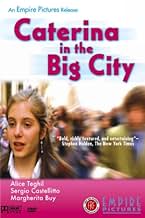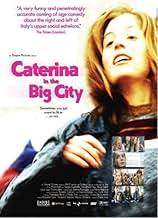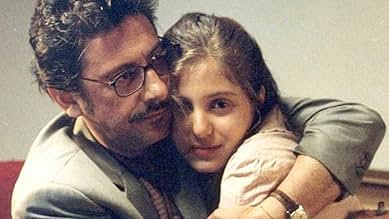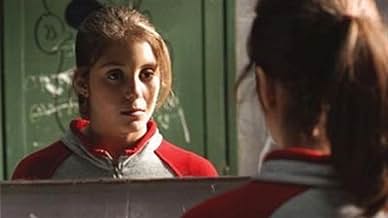IMDb-BEWERTUNG
6,8/10
3258
IHRE BEWERTUNG
Die dreizehnjährige Caterina zieht mit ihren Eltern nach Rom, wo sie sich mit den Komplikationen des Lebens in der großen Metropole konfrontiert sieht.Die dreizehnjährige Caterina zieht mit ihren Eltern nach Rom, wo sie sich mit den Komplikationen des Lebens in der großen Metropole konfrontiert sieht.Die dreizehnjährige Caterina zieht mit ihren Eltern nach Rom, wo sie sich mit den Komplikationen des Lebens in der großen Metropole konfrontiert sieht.
- Regie
- Drehbuch
- Hauptbesetzung
- Auszeichnungen
- 7 Gewinne & 9 Nominierungen insgesamt
Zach Wallen
- Edward
- (as Zach -James Smith- Wallen)
Margerita Mazzola
- Martina
- (as Margherita Mazzola)
Martina Tasquetta
- Alessia
- (as Martina Taschetta)
Giulia Gorietti
- Giada
- (as Giulia Elettra Gorietti)
Empfohlene Bewertungen
CATERINA IN THE BIG CITY offers a novel and original approach to The Teen Genre. A timeless 'Coming of Age' tale is portrayed with truth and style, although the specifics of contemporary Italian politics lose a bit in translation, even a viewer who is ignorant of European politics is not left in the dark. Caterina (played by Alice Teghil) is a junior high school aged student who relocates to Rome with her family. Her father is a frustrated teacher who feels that his career has been sidetracked in the sleepy, coastal town of Monalto, and looks forward to the possibility of social and intellectual advancement in the big city. Soon, he runs up against the stratified nature of Italian society, and Caterina encounters the same setup, but within her school system. From her first day in class, she meets classmates who toss around political jeremiads which they don't really comprehend, but are very emotionally attached. Although, by the end of the school year, Caterina is moved and changed by her experiences, she seems to understand that these emotionally charged names and categories never tell the whole story, and really amount to passionate clichés. Paolo Virzì, the director, is known in Italy for his ability to examine the entrenched nature of Italian politics with humor and insight. CATERINA IN THE BIG CITY an intelligent look at what it is like to live in a stratified society, and to strive to locate your unique and proper place.
One of the best movie I've seen recently. An exciting coming of age, an exhilarating comedy, a deep and painful portrait of our society at the present moment."Caterina Va in Città" has outrageously funny scenes starting with Giancarlo's biting farewell to his despised small-town students. But it's a very dark sense of humor. The film is really about personalities, especially his. Imagine a standard coming-of- age movie about a smart, unusual kid learning that it's okay to be an individual, different from the rest. Giancarlo is that kid, only he's 40-something and he hasn't had that final scene where everything turns out okay. Angry that others have gotten all the breaks in life, he righteously criticizes the establishment, big money, the old boys' network, and yet envies them at the same time. Back in Rome, he has a chance to mingle with exactly the class of people he inwardly resents, and every chance he gets to make a mark among them turns to embarrassment.
Played with great flair by Sergio Castellitto (the insouciant chef from "Mostly Martha"), Giancarlo is an enormously sympathetic but uncomfortable character, and his contradictions have a ripple effect on everyone in his orbit. His wife Agata (Margherita Buy) lives in a shell rather than get in the way of her grandiose husband. Caterina (Alice Teghil) is thrust uneasily into a social scene she's thoroughly unprepared for, made even more out of place by her dad's instructions. She doesn't seem to have inherited his low self-esteem, but this new life flies way over her head most of the time. It's a complex portrait of a family's struggle, set amid the tumult of big-city society and class consciousness. "Caterina" is a very rewarding movie.
Played with great flair by Sergio Castellitto (the insouciant chef from "Mostly Martha"), Giancarlo is an enormously sympathetic but uncomfortable character, and his contradictions have a ripple effect on everyone in his orbit. His wife Agata (Margherita Buy) lives in a shell rather than get in the way of her grandiose husband. Caterina (Alice Teghil) is thrust uneasily into a social scene she's thoroughly unprepared for, made even more out of place by her dad's instructions. She doesn't seem to have inherited his low self-esteem, but this new life flies way over her head most of the time. It's a complex portrait of a family's struggle, set amid the tumult of big-city society and class consciousness. "Caterina" is a very rewarding movie.
"Caterina va in città" seems like your typical teen film. It somehow reminds me of "Thirteen", but it goes a little deeper than the average American teen film.
In American teen films the parents are normally reduced to simple shadows that serve more as a background for their sons and daughters' lives - they are either of the preaching-repressive sort, or the tolerant, ever-forgiving parents, that eventually through love will help their children to the way of redemption.
Not so, "Caterina va in città". In this film, not just Caterina ( Alice Teghil) but her parents as well are portrayed as three-dimensional human beings and this makes the film more interesting.
Caterina and her parents move from a small Italian town to Rome. And there Caterina's life will be shaken. She goes to high school and meets new friends - many new things happen in her life. She feels uprooted from her old self, and doesn't know anymore who she really is.
One can say that "Caterina va in città" is a coming of age film - it portrays her search for her place in the world - many American teen films tell the same story. But what differentiates this film from its American counterparts is the attention it gives to the parents. The father Giancarlo (Sergio Castellito) is a deeply disturbed personality. He thinks the world revolves around him and there's a conspiracy of important segments of society whose main aim is preventing him from succeeding in life. He is an egoist that treats his wife as a dumb servant and his daughter as a beautiful puppy. But no, he's not a "bad" man - in his own distorted way he loves his wife and his daughter. Sergio Castellito gives us a stellar interpretation as the problematic father, underlining his pathetic and quixotic traits. Agata (Margherita Buy), is his ever-enduring wife - she has a deeper layer than it may appear at first glance. And there's Caterina living with them, seeing them with her innocent eyes.
The other characters in the film are what one could call walking clichés. Nothing that has not been shown before in American teen movies. Politics shows its colors in the film, but in a very superficial way. It's not really essential for the film's story - left and right could have been easily substituted for rival football teams.
The ending (difficult to imagine in American films) will come as a surprise and have a liberating effect on the viewer. All in all, "Caterina va in città" is a good teen film thats stands a bit above the usual film of the genre.
In American teen films the parents are normally reduced to simple shadows that serve more as a background for their sons and daughters' lives - they are either of the preaching-repressive sort, or the tolerant, ever-forgiving parents, that eventually through love will help their children to the way of redemption.
Not so, "Caterina va in città". In this film, not just Caterina ( Alice Teghil) but her parents as well are portrayed as three-dimensional human beings and this makes the film more interesting.
Caterina and her parents move from a small Italian town to Rome. And there Caterina's life will be shaken. She goes to high school and meets new friends - many new things happen in her life. She feels uprooted from her old self, and doesn't know anymore who she really is.
One can say that "Caterina va in città" is a coming of age film - it portrays her search for her place in the world - many American teen films tell the same story. But what differentiates this film from its American counterparts is the attention it gives to the parents. The father Giancarlo (Sergio Castellito) is a deeply disturbed personality. He thinks the world revolves around him and there's a conspiracy of important segments of society whose main aim is preventing him from succeeding in life. He is an egoist that treats his wife as a dumb servant and his daughter as a beautiful puppy. But no, he's not a "bad" man - in his own distorted way he loves his wife and his daughter. Sergio Castellito gives us a stellar interpretation as the problematic father, underlining his pathetic and quixotic traits. Agata (Margherita Buy), is his ever-enduring wife - she has a deeper layer than it may appear at first glance. And there's Caterina living with them, seeing them with her innocent eyes.
The other characters in the film are what one could call walking clichés. Nothing that has not been shown before in American teen movies. Politics shows its colors in the film, but in a very superficial way. It's not really essential for the film's story - left and right could have been easily substituted for rival football teams.
The ending (difficult to imagine in American films) will come as a surprise and have a liberating effect on the viewer. All in all, "Caterina va in città" is a good teen film thats stands a bit above the usual film of the genre.
I wish I could say that this was a great film because there really were a lot of things that one could like about it.
As it turns out, however, it is a good, but flawed film. I will give this film a recommendation, I think it is worth seeing.
The film made a number of incredible social statements. It really cuts to the quick about the nature of society, the people who can manipulate the system on both sides are in collusion with each other to keep their privilege. The people who are on the outside find themselves on the outside, looking in. They can be taken under someone's wing but they are never really more then a pet, the Jimmy Olsen to someone's Superman.
The film had spectacular acting, particularly from the lead.
So what then keeps the film from being great? One of the biggest problems comes from the episodic and picaresque structure of the film. It has the kind of structure that is more interesting because of its discontinuity then because of its continuity. And while it makes for a lot of interesting discussions, this could turn a lot of people off, probably even more then the subtitles.
Honestly, the problem is that it begins with Caterina being pulled in many directions and it allows us to see facets of her through these different social lenses. The trouble is that we never get a baseline reading on her in the beginning before she moves to Rome. This is done very well but we never get the impression of her as anything more then a tablet that the ideologies of others are being written on, even at the end of the film when she supposedly finds herself. I won't give a spoiler as to how but the ending that someone else commented was her in her element is really just another case of this.
You know what, I've changed my mind. This is a wonderful film to watch. Its a spectacular way to look at what life is really like when you are outside the powerful and privileged circles of society and you can only be influenced by the ideologies of others but you really lack any voice of your own.
Watch this along with Welcome to the Dollhouse and see what life was like for the rest of us. Let this film show you the social cliques, collusion and ideology and let Solondz show you the sheer cruelty of a society that, as J. G. Ballard said, normalized psychopathy. And see it for what it really is, not some sugarcoated network television version (I think you guys know what very popular television series I'm talking about).
As it turns out, however, it is a good, but flawed film. I will give this film a recommendation, I think it is worth seeing.
The film made a number of incredible social statements. It really cuts to the quick about the nature of society, the people who can manipulate the system on both sides are in collusion with each other to keep their privilege. The people who are on the outside find themselves on the outside, looking in. They can be taken under someone's wing but they are never really more then a pet, the Jimmy Olsen to someone's Superman.
The film had spectacular acting, particularly from the lead.
So what then keeps the film from being great? One of the biggest problems comes from the episodic and picaresque structure of the film. It has the kind of structure that is more interesting because of its discontinuity then because of its continuity. And while it makes for a lot of interesting discussions, this could turn a lot of people off, probably even more then the subtitles.
Honestly, the problem is that it begins with Caterina being pulled in many directions and it allows us to see facets of her through these different social lenses. The trouble is that we never get a baseline reading on her in the beginning before she moves to Rome. This is done very well but we never get the impression of her as anything more then a tablet that the ideologies of others are being written on, even at the end of the film when she supposedly finds herself. I won't give a spoiler as to how but the ending that someone else commented was her in her element is really just another case of this.
You know what, I've changed my mind. This is a wonderful film to watch. Its a spectacular way to look at what life is really like when you are outside the powerful and privileged circles of society and you can only be influenced by the ideologies of others but you really lack any voice of your own.
Watch this along with Welcome to the Dollhouse and see what life was like for the rest of us. Let this film show you the social cliques, collusion and ideology and let Solondz show you the sheer cruelty of a society that, as J. G. Ballard said, normalized psychopathy. And see it for what it really is, not some sugarcoated network television version (I think you guys know what very popular television series I'm talking about).
Caterina gives us an opportunity to feel and a chance to hope. A young girl both naive and somehow mature, she is unsure of what she wants in life. Her task is learning to navigate the waters of a high school in Rome where she is the new girl from the sticks when her father is transfered from a small town on the coast. He fulfills his dream of returning to the cultural mecca of the capital where he hopes to take his "rightful" place among the intelligentsia. But the film turns on just this point"rightful place". There are no simple answers, though we do have an opportunity to see how complex it is to find one's place, rightful or not, in the world. Caterina is something of a metaphor for the Italian populace at large, I would think. But she is more than this. There is something about her story that touched me, several decades and half a world away from the world she inhabits, a world stratified by cliques and patronage, prejudice and injustice...a world very much like the one I live in and the one I imagine most of us live in. Caterinaas the film that bears her namedoes not take the easy way out in running away or self-repression or living a life of quiet desperation, even when her sheltered provincial upbringing and less-than-ideal family situation do not give her any clues on how to deal with her new life and classmates from prominent families. She tries to adjust to the fast-pace and superficiality of life in the Italian capital, and much of the fun of the movie is seeing her in the various situations she encounters along the way. Her father is great as the frustrated writer with no talent and a loud voice, a self-important boor. My heart goes out to all the Caterinas of the world, who go forward with optimism and pure heart even when they know the odds are against them.
Wusstest du schon
- WissenswertesSara Pallini's debut.
- PatzerThe story begins in 2003, but the dates do not match up with the days of the week for that year.
- VerbindungenReferences Blues Brothers (1980)
- SoundtracksInno ufficiale dei giovani fascisti
Music by Giuseppe Blanc and lyrics by Vittorio E. Bravetta
Sung at the wedding reception
Top-Auswahl
Melde dich zum Bewerten an und greife auf die Watchlist für personalisierte Empfehlungen zu.
- How long is Caterina in the Big City?Powered by Alexa
Details
Box Office
- Bruttoertrag in den USA und Kanada
- 296.464 $
- Eröffnungswochenende in den USA und in Kanada
- 9.352 $
- 5. Juni 2005
- Weltweiter Bruttoertrag
- 4.407.426 $
- Laufzeit
- 1 Std. 47 Min.(107 min)
- Farbe
- Sound-Mix
- Seitenverhältnis
- 2.35 : 1
Zu dieser Seite beitragen
Bearbeitung vorschlagen oder fehlenden Inhalt hinzufügen






















